Apple has announced the iPhone 16 series. Here's everything you need to know about the most anticipated phones of 2024.
iPhone 16 and iPhone 16 Plus
Let's start with the regular versions. The iPhone 16 and iPhone 16 Plus now have an Action button (instead of the silent/mute switch), which was previously exclusive to the Pro versions. In addition to this, both of the non-Pro models have gained a macro lens for the rear camera array.
The iPhone 16 features a 6.1-inch Super Retina XDR OLED display with a Dynamic Island at the top of the screen. The panel supports 60Hz Refresh Rate, and has a screen resolution of 2556 x 1179 pixels, 2000 nits peak brightness and 1 nit minimum brightness.
All models in the iPhone 16 series run on iOS 18, and support Emergency SOS via satellite, Crash Detection, Roadside Assistance via satellite, Messages via satellite. Of course, the highlight of the devices is the AI feature, Apple Intelligence. But here's the thing, these features are not even ready for launch. A footnote on the announcement page says that Apple Intelligence "will be available in beta next month as part of iOS 18.1, iPadOS 18.1, and macOS Sequoia 15.1". And that's just for the U.S., Apple stated that it will add support for other localized English versions for the U.K., Australia, New Zealand, South Africa, and Canada, in December.
As for the chipset on the iPhone 16 and 16 Plus, Apple chose to skip the A17 chips entirely. Instead, the devices are powered by the A18 chip that has a 6-core CPU with 2 performance and 4 efficiency cores. Apple says that the 3nm A18 chip is 30% more power-efficient, and up to 30% faster than the iPhone 15's A16 Bionic. It offers 17% more system memory bandwidth. The GPU has 5-cores, and the company says it is "desktop-class", and offers 40% faster performance while using 35% less power. The Neural Engine has 16-cores, and the NPU offers 2x faster performance for machine learning tasks.
Apple says that the iPhone 16 will offer 22 hours of battery life for video playback, 18 hours of video streaming, or 80 hours of audio playback. In compairsion the iPhone 16 Plus will get you 27 hours video playback, 24 hours video streaming, or 100 hours audio playback.
The iPhone 16 and 16 Plus are still made of Aluminium, with Titanium being "reserved" for the more expensive Pro models. The important change here is the addition of a Camera Control button, which sits below the power button. It offers a variety of shortcuts such as single click to open the camera or take a picture, click and hold to start a video recording, zoom, etc.
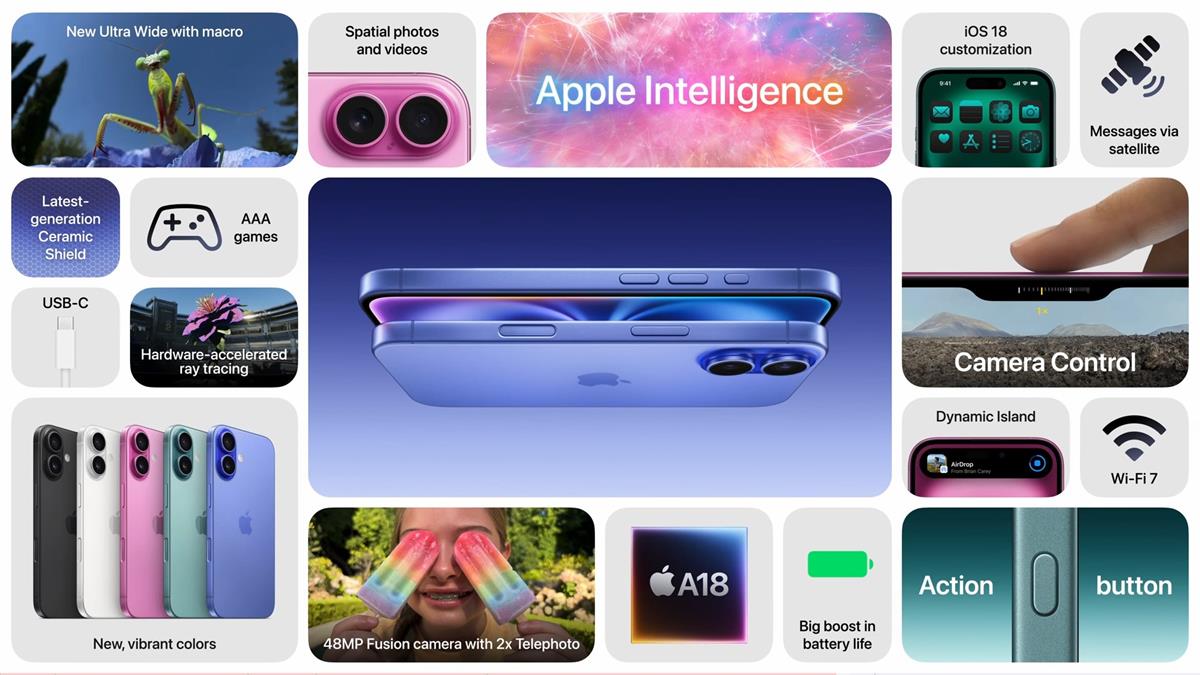
iPhone 16 models sold in the U.S. will not have a physical SIM card tray, i.e. they only support eSIMs. All models sold in other Countries have a physical SIM tray.
Apple has announced support for Messages via Satellite in Canada, and Roadside Assistance in U.K. (coming soon) via Green Flag.
iPhone 16 and iPhone 16 Plus Technical Specifications
- Display: iPhone 16: 6.1-inch Super Retina XDR OLED display, 60Hz Refresh Rate, HDR, 2556 x 1179 pixels, 460 PPI, 2,000,000:1 contrast ratio, True Tone Display, Wide Color Display (P3), Haptic Touch, 2000 nits peak brightness (1 nit minimum) Dynamic Island; iPhone 16 Plus: 6.7-inch, 2796 x 1290 pixels
- Operating System: iOS 18
- AI: Siri, Apple Intelligence,
- Emergency Features: Emergency SOS via satellite, Crash Detection, Roadside Assistance via satellite, Messages via satellite
- Processor: A18 chip with 6-core CPU with 2 performance and 4 efficiency cores
- GPU: 5-core GPU
- NPU: 16-core Neural Engine
- Storage: 128 GB/256 GB/512 GB
- Battery Life: iPhone 16: 22 hours video playback, 18 hours video streaming, 80 hours audio playback; iPhone 16 Plus: 27 hours video playback, 24 hours video streaming, 100 hours audio playback (No charger in the box) MagSafe, Qi2, and Qi wireless charging, Up to 50% charge in 35 minutes with 20W adapter, or 30W adapter + MagSafe Charger
- Front Camera: TrueDepth camera, 12 Megapixels, f/1.9 aperture, Retina Flash, Photonic Engine, Deep Fusion, Animoji and Memoji
- Rear Cameras: 48 Megapixels Fusion Camera f/1.6 aperture + 12 Megapixels Ultra Wide lens, f/2.2 aperture, Sensor-shift optical image stabilization, .5x, 1x, 2x optical zoom options, True Tone flash, Photonic Engine, Deep Fusion
- Video Recording: 4K Dolby Vision video recording at 24 fps, 25 fps, 30 fps, or 60 fps, 1080p Dolby Vision video recording at 25 fps, 30 fps, or 60 fps, Cinematic mode up to 4K Dolby Vision at 30 fps, Action Mode, Spatial video recording at 1080p at 30 fps, Macro video recording, including slo?mo and time?lapse, Slo?mo video support for 1080p at 120 fps or 240 fps, Time-lapse video with stabilization, Night mode Time-lapse, QuickTake video (up to 4K at 60 fps in Dolby Vision HDR), Sensor-shift optical image stabilization for video, Audio zoom, SpatialAudio and stereo recording, Wind noise reduction, Audio Mix
- Buttons: Action button, Camera Control button
- Security: Face ID with TrueDepth sensor, Apple Pay
- Connectivity: Dual eSIM, GSM/EDGE, UMTS/HSPA+, DC-HSDPA, 5G (sub-6 GHz and mmWave) with 4x4 MIMO, Gigabit LTE, Voice over LTE (VoLTE), Wi-Fi 7 (802.11be) with 2x2 MIMO, Bluetooth 5.3, Second-generation Ultra Wideband chip, GPS, GLONASS, Galileo, QZSS, and BeiDou, NFC
- Port: USB-C (USB Gen 2)
- Design: Ceramic Shield front, Aluminum frame with color-infused glass back
- Colors: Ultramarine, Teal, Pink, White, Black
- Video and Audio: HDR with Dolby Vision, HDR10+/HDR10, and HLG, Spatial Audio playback, Dolby Atmos
- Sensors: High dynamic range gyro, High-g accelerometer, Proximity sensor, Dual ambient light sensors, Barometer
- Dimensions: iPhone 16: 5.81 x 2.82 x 0.31 inches (147.6 x 71.6 x 7.80 mm); iPhone 16 Plus: 6.33 x 3.06 x 0.31 inches (160.9 x 77.8 x 7.80 mm)
- Weight: iPhone 16: 6.00 ounces (170 grams); iPhone 16 Plus: 7.03 ounces (199 grams)
- Rating: IP68 Splash, Water, and Dust Resistant (maximum depth of 6 meters up to 30 minutes) under IEC standard 60529
iPhone 16 Pro and Pro Max
The iPhone 16 Pro models have bigger displays. The regular iPhone 16 Pro sports a 6.3-inch Super Retina XDR OLED screen that supports Always-On Display, 120 Hz refresh rate with ProMotion technology and has a resolution of 2622 x 1206 pixels. The iPhone 16 Pro Max has an even bigger screen which is 6.9-inch in size, at a resolution of 2868 x 1320 pixels. And as expected, both variants come with bigger batteries.
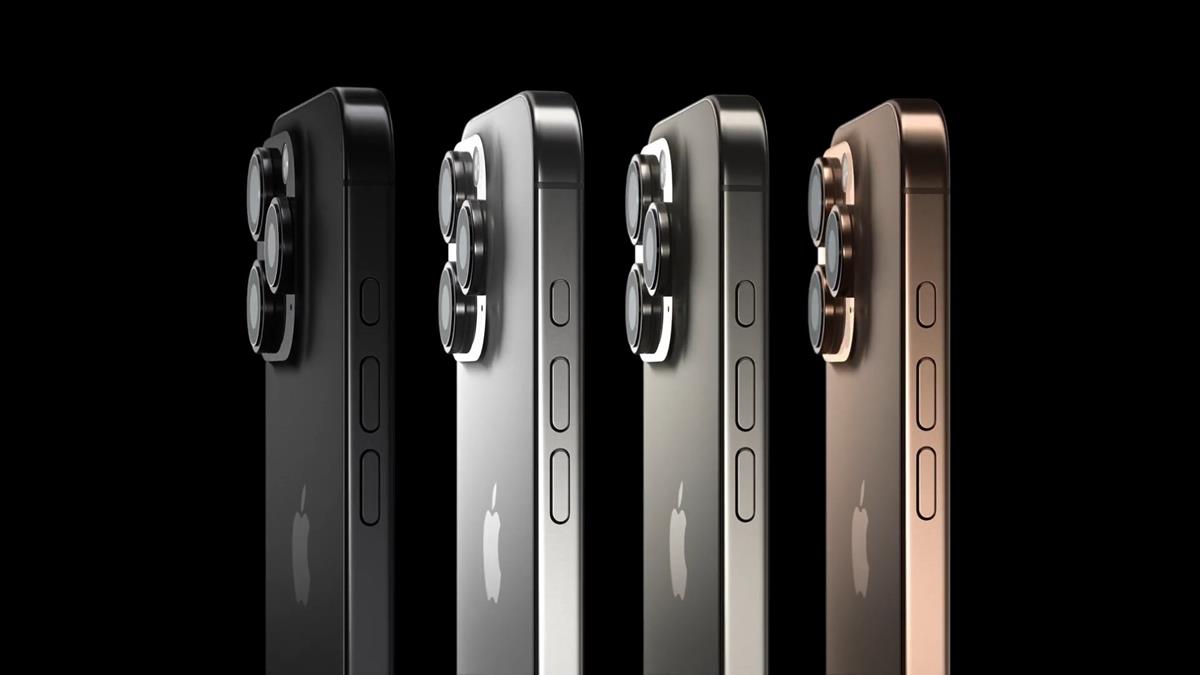
The Pro models have a different CPU, they are powered by the A18 Pro chip with 6-CPU cores, and have one extra GPU core, i.e. 6-cores compared to 5-cores on the basic and Plus versions. Apple says that the A18 Pro, also a 3nm chip, and compared to the A17 Pro, uses 20% less power, has 17% better memory bandwidth and is 15% faster in terms of the CPU. The GPU is 20% better, and supports 2x faster ray tracing performance.
Apple continues to equip the Pro models with a Titanium finish for the casing and a textured matte glass back. The rear camera array on the iPhone 16 Pro and Pro Max consist of a 48 Megapixels Fusion Camera, a 48 Megapixels Ultra Wide lens, and a 12 Megapixels Telephoto lens, with the main upgrade being the Ultra Wide lens which was only 12 MP on the previous gen model.
The iPhone 16 Pro models share a lot of similarities with the regular and Plus versions. In order to keep the article shorter to read, I'll just list the main differences below.
iPhone 16 Pro and Pro Max Tech Specs
- Display: iPhone 16 Pro: 6.3-inch Super Retina XDR OLED, Always-On Display, ProMotion technology (120Hz refresh rate), 2622 x 1206 pixels; iPhone 16 Pro Max: 6.9-inch, 2868 x 1320 pixels
- CPU: A18 Pro chip with 6-core CPU
- GPU: 6-core GPU
- Rear Cameras: 48 Megapixels Fusion Camera f/1.78 aperture + 48 Megapixels Ultra Wide lens, f/2.2 aperture + 12 Megapixels Telephoto lens, f/2.8 aperture, Second gen Sensor-shift optical image stabilization, .5x, 1x, 2x, 5x optical zoom options, Adaptive True Tone flash, Photonic Engine, Deep Fusion, Dolby Vision up to 4K at 120 fps, Apple ProRAW
- Front Camera: ProRes video recording up to 4K at 60 fps with external recording
- Design: Titanium with textured matte glass back
- Battery Life: iPhone 16 Pro: 27 hours video playback, 22 hours video streaming, 85 hours audio playback; iPhone 16 Pro Max: 33 hours video playback, 29 hours video streaming, 105 hours audio playback, up to 50% charge in 30 minutes (35 for Pro Max) with 20W adapter or 30W MagSafe Charger
- Sensors: LiDAR Scanner
- Port: USB-C (USB Gen 3)
- Audio: Studio-quality four-mic array
- Connectivity: Precision dual-frequency GPS (GPS, GLONASS, Galileo, QZSS, BeiDou, and NavIC)
- Colors: Desert Titanium, Natural Titanium, White Titanium, Black Titanium
- Dimensions: iPhone 16 Pro: 5.89 x 2.81 x 0.32 inches (149.6 x 71.5 x 8.25 mm); iPhone 16 Pro Max: 6.42 x 3.06 x 0.32 inches (163 x 77.6 x 8.25 mm)
- Weight: iPhone 16 Pro: 7.03 ounces (199 grams); iPhone 16 Pro Max: 7.99 ounces (227 grams)
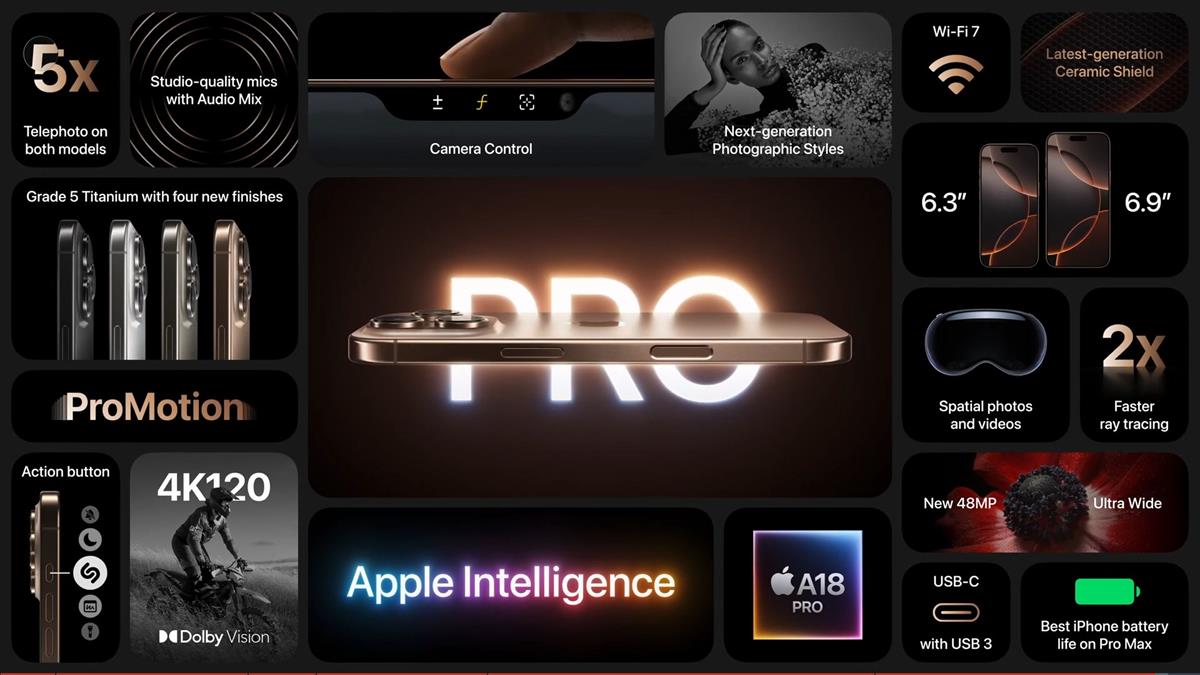
iPhone 16 pricing:
The basic model of the iPhone 16 starts at $799 (128GB), $899 (256 GB), $1099 (512 GB), while the iPhone 16 Plus costs $899 (128GB), $999 (256 GB), $1199 (512 GB).
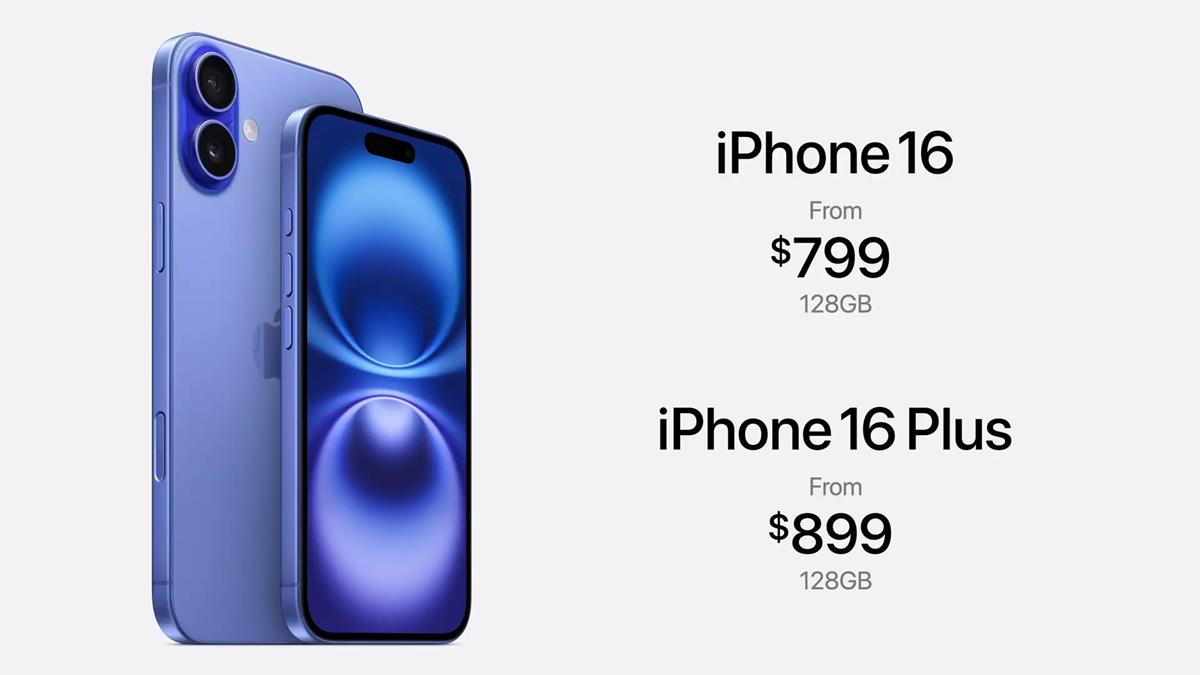
The iPhone 16 Pro has been priced at $999 (128 GB), $1099 (256 GB), $1299 (512 GB), and $1499 (1TB), while the iPhone 16 Pro Max carries a price tag of $1199 (256 GB), $1399 (512 GB), and $1599 (1 TB).
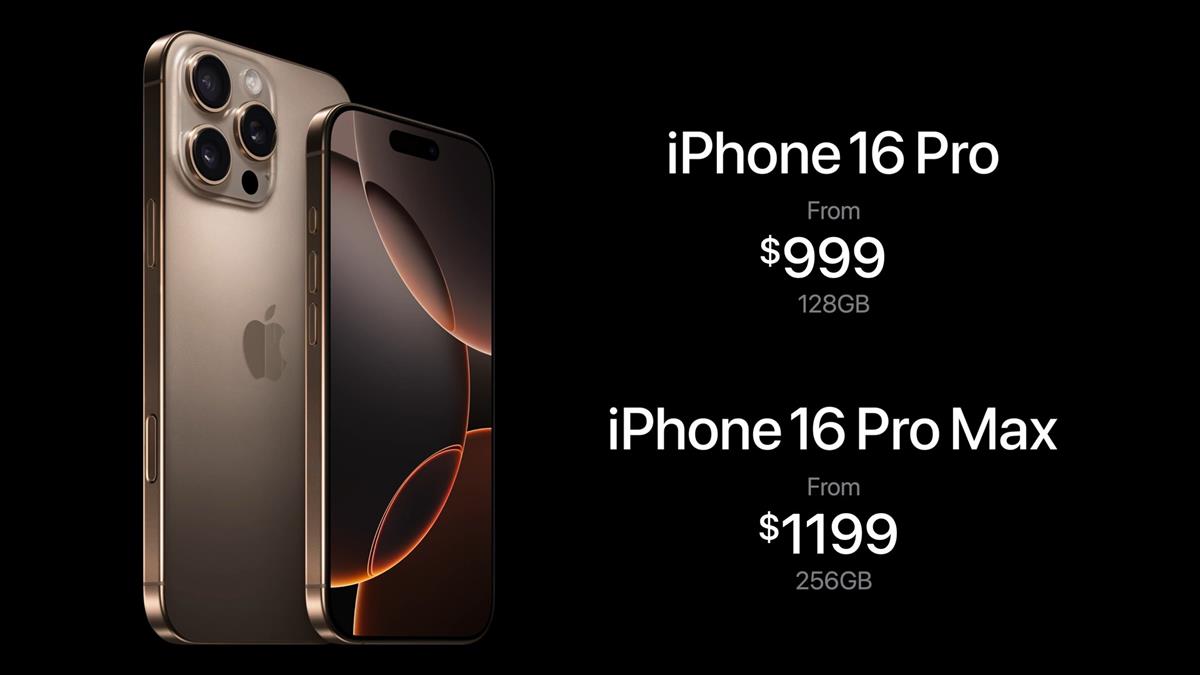
Pre-orders for the iPhone 16 will open on September 13, and the devices will start shipping on September 20.
Personal opinions
iPhone 16: Yup, the basic model still has a 60Hz display in 2024. Only Apple can pull this con, for context, the Google Pixel 9 supports 120Hz and costs the same. It is also worth noting that both the iPhone 16 and the iPhone 16 Plus only support USB 2 speeds (up to 480Mb/s), whereas the Pro Models support USB 3 (up to 10 GB/s). That said, the regular version is the smallest iPhone you can get, which is important for a lot of people. MacRumors says that all iPhone 16 models have 8 GB of RAM. Welcome to 2017, Apple!
iPhone 16 Plus: The iPhone 16 Plus has been priced an extra $100 over the basic model, for which you get a bigger display with a slightly better resolution, but yet again there is no ProMotion Display, i.e. 120Hz refresh rate.
The only other difference between the iPhone 16 and the iPhone 16 Plus, is that the latter offers a better battery life at 27 hours of video playback, as opposed to 22 hours on the basic version. The Plus model has always been a weird choice. It's better than the basic model, but not as good as the Pro or Pro Max. So a lot of users tend to ignore the Plus model. Even Apple's comparison page is set to showcase the other three models, I know the page is configured to only display three models at a time, but it's kind of funny if you think about it.
iPhone 16 Pro and Pro Max: A huge display with 120Hz refresh rate, a bigger battery, and better cameras are the main selling points of the iPhone 16 Pro models. The faster USB speeds, and better processor/GPU are also worth a mention. Are these features worth an extra $200 or $400? That largely depends on your usage, these devices are probably good for those who watch a lot of videos or play games on their phone.
I don't think it is worth upgrading from the iPhone 15 to the iPhone 16. Heck, I still use an iPhone 13 which is nearly 2 years old, and still as good as new. Apple's devices last a lot longer compared to Android phones, not just in terms of software updates, but also in the longevity of the hardware.
If you want to save money, go for the regular model of the iPhone 16, and it should last you a good 5 years or so. Paying an extra 100 bucks for the Plus version is probably not worth it. On the other hand, if money isn't an issue, get the iPhone 16 Pro or Pro Max.
Apple Watch Series 10 was launched with support for Sleep Apnea Detection. The company also announced AirPods 4, AirPods Max and Apple AirPods Pro 2. The AirPods Pro 2 is getting a hearing Aid feature.
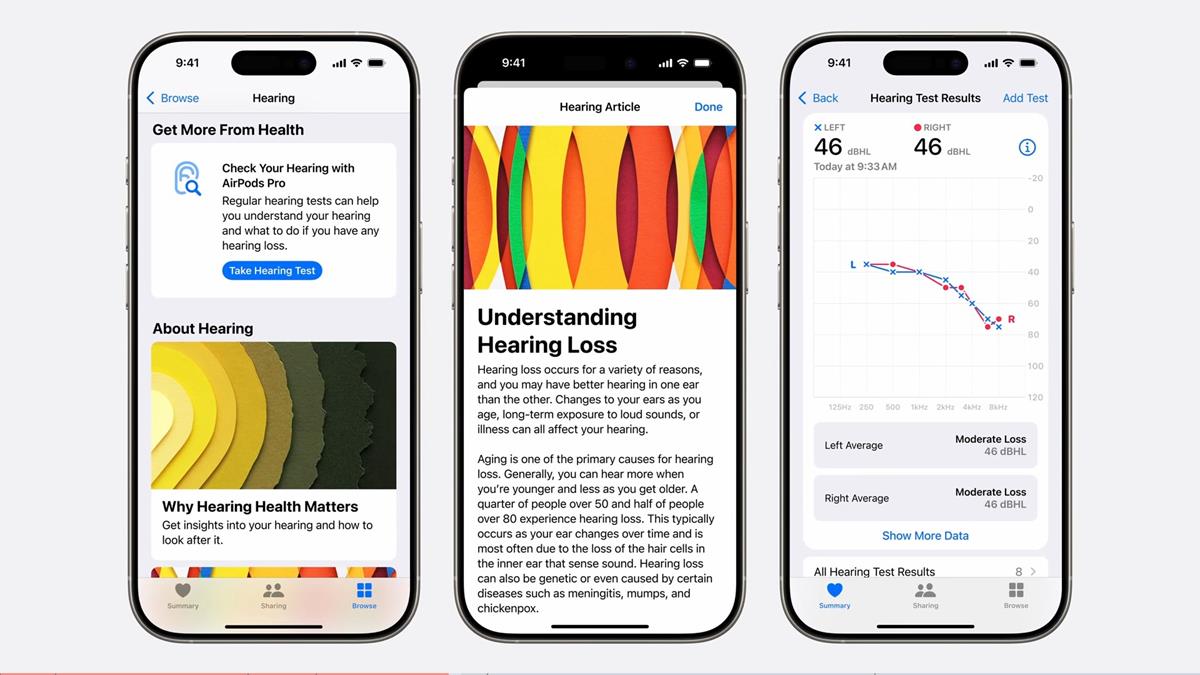
Missed the Apple's It's Glowtime event? You can watch it on YouTube. Apple will release iOS 18, iPadOS 18 and macOS 15 Sequoia on September 16.
Thank you for being a Ghacks reader. The post Apple announces iPhone 16, iPhone 16 Plus, iPhone 16 Pro and iPhone 16 Pro Max appeared first on gHacks Technology News.


0 Commentaires